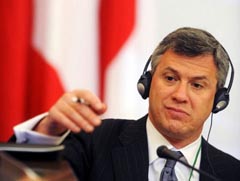American diplomats firmly pushed back Friday on reports suggesting that the U.S. must remove a controversial Iranian anti-regime group, the Mujaheddin-e-Khalq (MEK), from a U.S. list of  designated terrorist organizations.
designated terrorist organizations.
“MEK leaders appear to believe that the Secretary has no choice now but to delist them,” the State Department’s counter-terrorism coordinator Daniel Benjamin said in a call with reporters Friday. “That conclusion is quite plainly wrong.”
“In short, the court did not order the Secretary of State to revoke the MEK designation as a Foreign Terrorist Organization,” Benjamin continued. “The court has told the State Department that it must act by October 1, but it did not mandate a particular result. I think that’s very important to underscore. The Secretary thus retains the discretion to either maintain or revoke the designation in accordance with the law.
The State Department call was prompted by an impasse in efforts by the United States and United Nations to persuade members of the cultish group to leave their former paramilitary base in Iraq, Camp Ashraf.
To date, about 2,000 MEK members have been persuaded to leave Ashraf for the former U.S. Camp Liberty military base in Iraq, where they can be interviewed for possible relocation to third countries. But the last relocation convoy occurred in early May, and some 1,200-1,300 MEK members remain in Ashraf, and are apparently issuing new demands, emboldened by the perception the group’s terror designation may soon be revoked.
American officials have sought to encourage the relocation from Ashraf by indicating that cooperation in doing so will be a key factor in determining whether the group remains on the U.S. terror list. But a US court decision last month has interfered with that message.
In June, the US court of appeals ordered Secretary of State Hillary Clinton to issue a determination by October whether the MEK should be taken off the US terror list or its terror designation should be reissued.
Meantime, the Iraqi government is threatening to forcibly close the camp, and the United States is concerned about possible violence and a potential humanitarian disaster should relocation efforts continue to stall.
Despite the group’s terrorist designation, several prominent former senior American officials have taken large speaking fees to lobby for delisting the MEK. Among them, former FBI director Louis Freeh, former Pennsylvania governor Ed Rendell, former Vermont governor Howard Dean, former DHS chief Tom Ridge, former UN ambassador and top Mitt Romney foreign policy adviser John Bolton, former UN ambassador Bill Richardson, and former New York Mayor Rudi Giuliani. The Treasury Department issued subpoenas this past spring to determine who is paying for the massive lobbying effort on behalf of a designated terrorist group, and whether US criminal laws have been violated.
But American diplomats said Friday such lobbying will not impact the Secretary’s decision on the MEK’s designation.
“I do just want to underscore that when it comes to the designation itself, we have not met with any lobbyists or others,” Benjamin told reporters. “There was, in fact, one gentleman who came into my office under false pretenses from a foreign country to lobby for the MEK, and he was promptly thrown out.”
“Again, to underscore, we’re just looking at the merits of the particular case,” Benjamin added.

